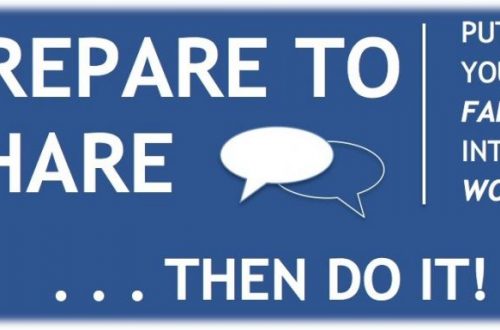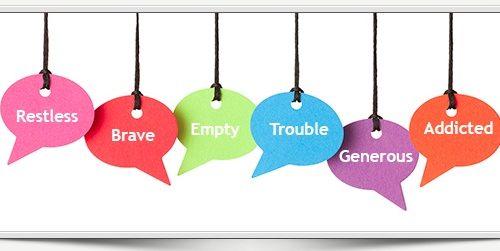-
Writing for Ministry: Ten Tips
Also, part of loving others and reaching the widest-possible audience is using gender-inclusive language. The following statement, with which I heartily agree, is adapted from the syllabus of one of my colleagues: “All written submissions should strive to use male/female-inclusive language. As a gospel-shaped, gospel-centered community of learning, we have compelling reasons to think, write, and speak in such a way as to ensure that none are either intentionally or inadvertently excluded by our use of language. Consider using ‘humans,’ ‘persons,’ ‘humanity,’ or ‘humankind”’ rather than ‘man’ or ‘men’ when referring to humans in general. Consider alternating between the use of ‘he’ and ‘she’ as generic pronouns or substituting…
-
Disabled Persons Bring Insights for Healthy Relationships
This summer I had the privilege of being a counselor at a camp for disabled persons. The counselors and campers enjoyed a week of swimming, horseback riding, fishing, bowling, paddle boats, crafts, Bible lessons, and worship. In the midst of the earthly activities, heavenly insights for healthy relationships with God and others emerged. I was blessed to be 24/7 with a blind person for the week. During the week, I noticed aspects of a healthy relationship with God. I learned quickly to go at the speed that she could walk at. Adjusting my speed to her reminded me of how God meets us where we are at. He knows our…
-
The Mix of Truth and Love
“…we are no longer to be children, tossed here and there by waves, and carried about by every wind of doctrine, by the trickery of men, by craftiness in deceitful scheming; but speaking the truth in love, we are to grow up in all aspects into Him, who is the head, even Christ…” Ephesians 4:14-15. She sighed and said, “So…how do I tell him?” My friend had confided that her husband had been criticized by a church leader, one whom they both respected. He was understandably hurt and defensive, a normal reaction. The conversation turned, however, when she gingerly mentioned there could be some merit in the criticism. Her…
-
Hearing Well and Being Heard Well
Everyone wants to be heard well, but are we as willing to hear others well? In order to understand ourselves and others, different ways to categorize people have emerged over the years such as Myers & Briggs, DISC, and Enneagram. I recently read about another way to categorize people in a book dealing with how we communicate, 5 Voices: How to Communicate Effectively with Everyone You Lead.[1] The book describes 5 different voices with which people communicate—the Pioneer, Creative, Connector, Guardian, and Nurturer. Each voice (think communication style when I use the word voice) has positive inclinations and negative tendencies. In analyzing the book through a biblical worldview, I discovered…
-
Bottling Civility: Talking Respectfully About Tough Topics
This blog first appeared over a year ago. I find that I need the message it contains even more than when I first posted it: "Understand this, my dear brothers and sisters! Let every person be quick to listen, slow to speak, slow to anger.” James 1:19 How can we talk about controversial topics in a meaningful way? I’ve witnessed or been in on some contentious discussions in the last several months. Some on Facebook have included profanity and name calling—and this among believers. On the other hand, I have the privilege of participating with a small, but diverse group of believers in some mind-expanding discussions on potentially explosive topics. Our…
-
3 Life Hacks That Will Revolutionize Your Relationships
Ever hear of “life hacks”? Little tips and tricks to make your life easier, like running a sticky note between your keyboard keys to collect crumbs and computer lint. Here are three life hacks that will act like relational lubricant. 1. “When you said/did X, I felt Y. Did you mean to communicate that?” Instead of assuming we know someone’s motives and thinking, we need to clarify that we understand what they intend. Sometimes things just come out wrong, not at all what is meant, and it’s easily misinterpreted. “When you gave me permission to take comp time after I worked all weekend, I sensed you were giving it begrudgingly…
-
God’s Power Tools – #7
Our most powerful tool in teaching empowers and enhances the use of all the other tools. It could easily be compared to a battery; it powers and recharges all the power tools God has placed in our hands for ministry. Our seventh power tool is love. God’s desires a relationship through us with each child; His love will flow to us then through us to them. Like a lantern it will project His light and dispel the lies of darkness which bombard them daily. How do we learn to wield this tool, to cut a path through the tangle of lies embedded in a child’s heart? Only love can unlock…
-
God’s Power Tools – #2
Christianity is more easily caught than taught! Children learn from hearing but they mimic what they see. In order to truly teach the Word of God we need it to become a living part of who we are. For this to happen we need more time in God’s Word than just our teaching preparation. We need to intimately connect with God through His Word as often as we can. The Bible is God’s second amazing power tool. It’s life changing. It says in 2 Timothy 3:14-17 (Net Bible) “You, however, must continue in the things you have learned and are confident about. You know . . . the holy writings,…
-
The Power of an Expert Speaking as a Fellow Traveler: Phillip Johnson
When my husband Jack was in seminary he was taught to speak as the expert from a posture of strength. If you talk about weakness, struggle or failure, speak in hindsight from the place of victory won. It’s not always safe to talk about your weaknesses. You don’t want to give your detractors or enemies ammunition. (Especially in churches.) In today's culture that mindset is changing. But, If you are an expert, why would you want to try to speak as a fellow-traveler? What might be the benefits of exposing your weaknesses, speaking of your struggles, or even failures? In the academy? In churches? Phillip Johnson, the father of…
-
What Is Your Voice: Expert or Fellow-Traveler? 5 Tips to Communicate with More Influence
Whether to friends and family or to an audience, whether consciously or unconsciously, we all assume a certain voice when we speak. Take this little test to find out if you are more of an expert or a fellow traveler… 1. Have you demonstrated mastery of a particular interest or passion? 2. Have you demonstrated over the long haul the ability to love well and have great relationships? Have you raised an outstanding family? 3. Have you demonstrated the power of the Holy Spirit in your life out of deep devotion to prayer and God’s Word, or in the crucible of suffering? 4. Have you demonstrated mastery of a profession…




































